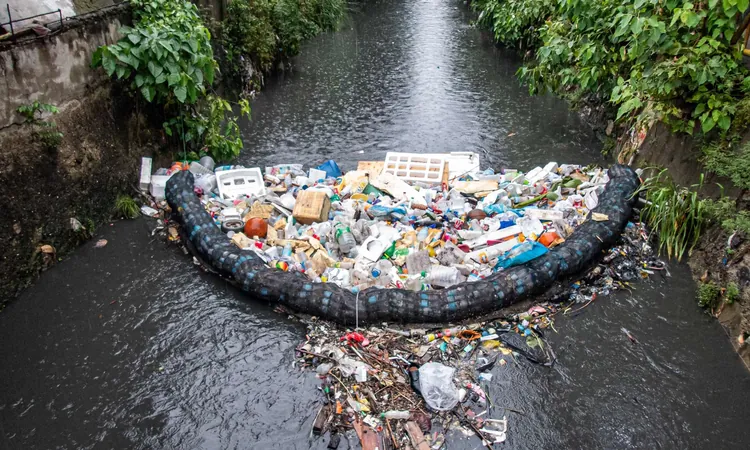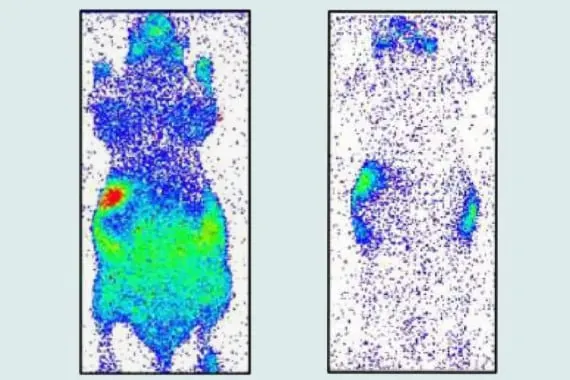
Revolutionizing Ocean Cleanup: AI Boosts Efficiency by Over 60%!
2025-04-28
Author: Amelia
The Ocean Plastic Crisis: An Urgent Call for Action
Our oceans are choking on plastic waste, endangering marine life and disrupting delicate ecosystems. For years, cleaning up these vast waters has felt like an insurmountable task. However, a groundbreaking new study has unveiled a game-changing solution: artificial intelligence (AI). This innovative research demonstrates a dramatic increase in the efficiency of ocean plastic cleanup by over 60%, bringing us one step closer to realizing a plastic-free ocean.
A New Era in Cleanup Efforts
Traditionally, ocean cleanup operations relied on simple, manual navigation methods. Ships scoured the sea on fixed paths, often missing concentrated areas of plastic due to the unpredictability of ocean dynamics. But from 2022 to 2024, researchers developed an advanced AI-driven routing algorithm that dynamically optimizes cleanup paths in real-time, adapting to fluctuating plastic densities and weather conditions. This new method not only enhances cleanup efficacy but also does so without escalating operational costs.
Unlocking the Power of AI in Cleanup Operations
At the heart of this breakthrough is a sophisticated mathematical model designed to optimize navigation like never before. By portraying the ocean as a complex network of routes, the model identifies the most efficient paths for plastic collection. This innovative approach can yield solutions within moments, even in the vastness of the ocean. It showed that, when applied to real data, AI could markedly elevate plastic collection rates from traditional methods.
Facing the Plastic Pollution Reality
With over 170 trillion pieces of plastic currently estimated to be floating in our oceans, the situation is dire. While discussions about climate action are prevalent, ocean plastic pollution often stays in the shadows. But experts like Jean Pauphilet from London Business School argue that AI has the potential to revolutionize these clean-up efforts, paving the way for more effective, environmentally-friendly solutions.
Real-World Applications Already Making Waves
Unlike many theoretical innovations, this AI model is already making an impact in the real world. The Ocean Cleanup initiative has seamlessly integrated this dynamic routing algorithm into its operational framework. Active in the Pacific Ocean, crews are reporting impressive reductions in downtime and more substantial trash collection, using a U-shaped screening system that captures plastic while safeguarding marine wildlife.
Adapt and Overcome: AI Tackles Weather Challenges
One of the study's notable findings reveals how AI can navigate through seasonal challenges. During turbulent winter months, the enhanced routing model does not merely maintain efficiency; it actually doubles plastic collection rates compared to older methods. By anticipating and adjusting operations in response to weather fluctuations, AI is reshaping the cleanup landscape.
Envisioning Future Innovations in Cleanup Technology
Beyond improving current cleanup tactics, the research team is examining how their AI model can inform the development of future technologies. They explored ways to either extend the operational range of collection systems or boost extraction speeds. Cutting extraction time present a game-changing opportunity to significantly heighten weekly cleanup rates, especially in challenging conditions.
A Blueprint for Global Environmental Solutions
The implications of this discovery stretch far beyond ocean cleanup. It challenges the prevailing notion that curing our planet's environmental woes necessitates colossal financial investments. Instead, smart strategies, data utilization, and agile decision-making could yield significant results within existing frameworks.
Towards a Sustainable, Plastic-Free Future
As the lifeblood of our planet, oceans are facing unprecedented threats from plastic pollution. This pioneering research illustrates how AI can shift the tide in our fight against this global crisis, making the vision of clean oceans a tangible reality. By harnessing the power of technology and innovative problem-solving, we are a step closer to restoring the blue heart of our Earth.









 Brasil (PT)
Brasil (PT)
 Canada (EN)
Canada (EN)
 Chile (ES)
Chile (ES)
 Česko (CS)
Česko (CS)
 대한민국 (KO)
대한민국 (KO)
 España (ES)
España (ES)
 France (FR)
France (FR)
 Hong Kong (EN)
Hong Kong (EN)
 Italia (IT)
Italia (IT)
 日本 (JA)
日本 (JA)
 Magyarország (HU)
Magyarország (HU)
 Norge (NO)
Norge (NO)
 Polska (PL)
Polska (PL)
 Schweiz (DE)
Schweiz (DE)
 Singapore (EN)
Singapore (EN)
 Sverige (SV)
Sverige (SV)
 Suomi (FI)
Suomi (FI)
 Türkiye (TR)
Türkiye (TR)
 الإمارات العربية المتحدة (AR)
الإمارات العربية المتحدة (AR)